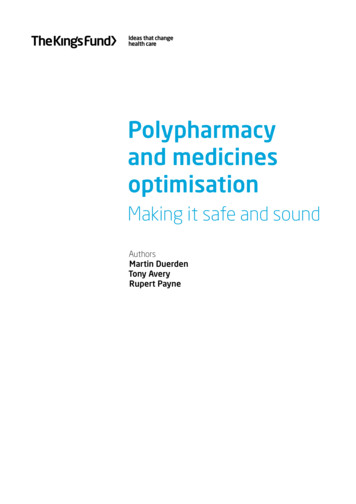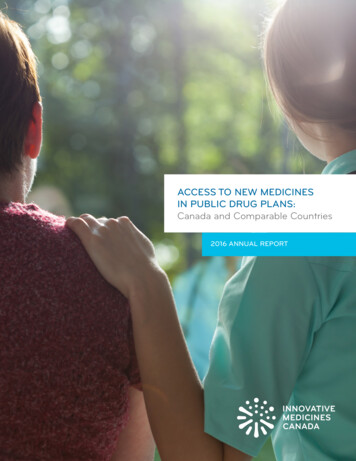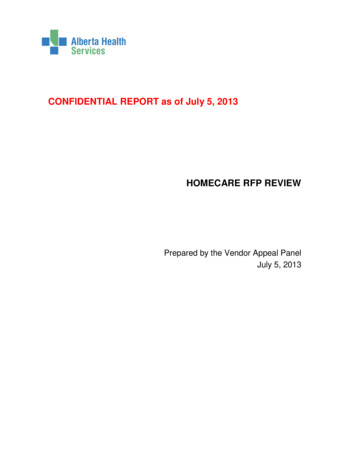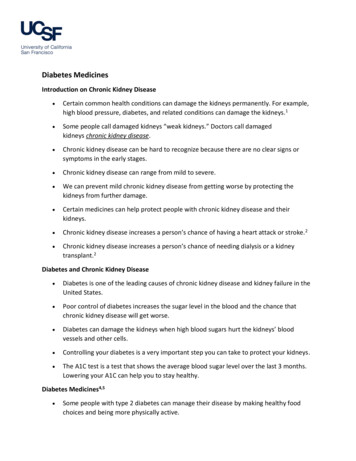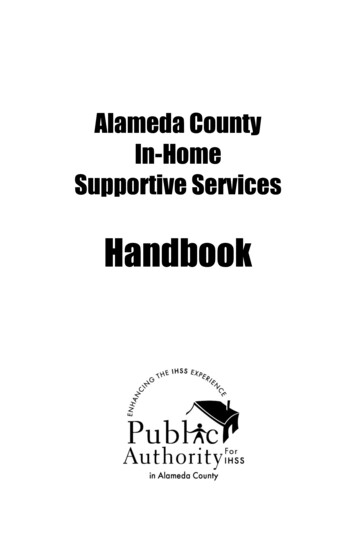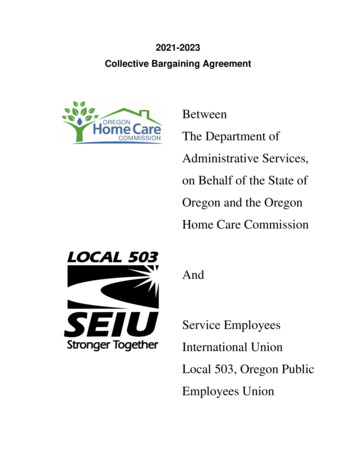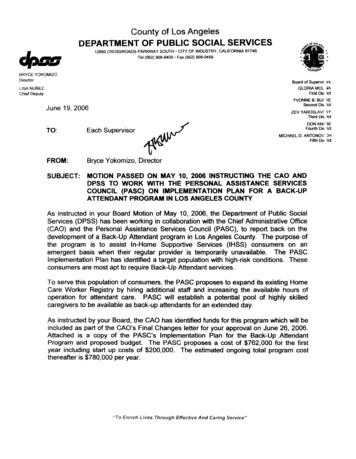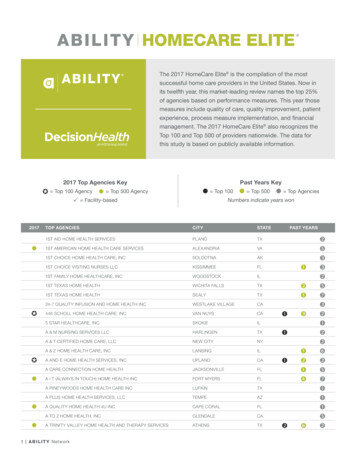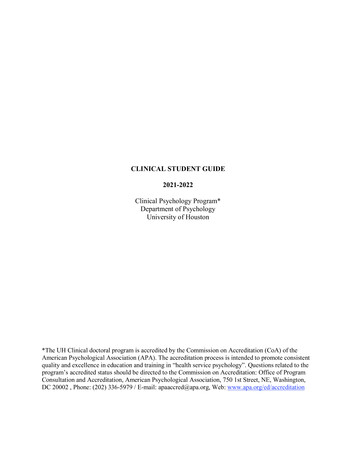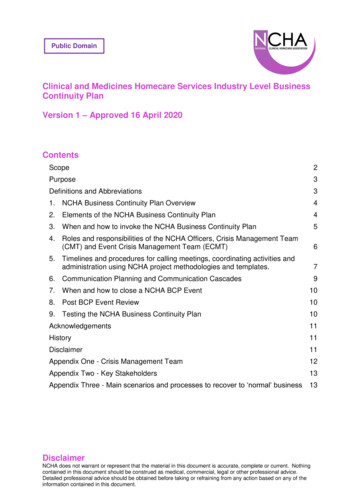
Transcription
Public DomainClinical and Medicines Homecare Services Industry Level BusinessContinuity PlanVersion 1 – Approved 16 April 2020ContentsScope2Purpose3Definitions and Abbreviations31. NCHA Business Continuity Plan Overview42. Elements of the NCHA Business Continuity Plan43.5When and how to invoke the NCHA Business Continuity Plan4. Roles and responsibilities of the NCHA Officers, Crisis Management Team(CMT) and Event Crisis Management Team (ECMT)65. Timelines and procedures for calling meetings, coordinating activities andadministration using NCHA project methodologies and templates.76. Communication Planning and Communication Cascades97. When and how to close a NCHA BCP Event108. Post BCP Event Review109. Testing the NCHA Business Continuity dix One - Crisis Management Team12Appendix Two - Key Stakeholders13Appendix Three - Main scenarios and processes to recover to ‘normal’ business13DisclaimerNCHA does not warrant or represent that the material in this document is accurate, complete or current. Nothingcontained in this document should be construed as medical, commercial, legal or other professional advice.Detailed professional advice should be obtained before taking or refraining from any action based on any of theinformation contained in this document.
Clinical and Medicines Homecare Services IndustryLevel Business Continuity PlanVersion 1 approved 16 April 2020ScopeThis BCP was commissioned by the NCHA Board to ensure a consistent approach to similarsituations that ensuring roles and responsibilities are clear and continuity of patient care.This BCP considers the impact of an emergency situation whether this be within an individualorganisation or an external factor impacting the entire industry situation.NCHA Board is responsible for ensuring this Business Continuity Plan is reviewed andupdated on an annual basis. Review should include lessons learned from an actualimplementation of the Business Continuity Plan or a test exercise.The Business Continuity Plan documents and Appendices will be maintained in a number oflocations to ensure that it can be accessed if NCHA systems are lost or buildings are notaccessible. The current locations for this are NCHA Office, NCHA Chair, Vice Chair andTreasurer.Credible Threats to Business Continuity that have been considered are in developing thisdocument are: Physical damage to critical infrastructure e.g. Fire, Explosion, Vehicle impactNatural disaster (e.g. Earthquake, Flood)Regulatory enforcement actionSickness (e.g. epidemic, pandemic)Loss of staff (e.g. Lottery win, Industrial dispute)Loss of systems (e.g. Computer malware)Loss of Utilities (e.g. electricity supply water)Fuel shortagesSignificant or prolonged shortages of medicines, ancillaries or equipmentUnplanned loss of key supplier or sub-contractorFor further information please contact info@clinicalhomecare.co.ukNCHA Limited Registered Office: Ground Floor, 4 Victoria Square, St Albans, Hertfordshire,AL13TF.A Private Limited Company registered in England and Wales No: 6642621Page 2 of 13
Clinical and Medicines Homecare Services IndustryLevel Business Continuity PlanVersion 1 approved 16 April 2020PurposeThe National Clinical Homecare Association Business Continuity Plan (BCP) aims to ensure aconsistent approach in the event of a major incident. The focus of the plan is to: Provide a clear communication strategy across all stakeholdersMinimise patient harm arising from the incident/ situationMaintain continuity of treatment and patient well-beingMaintain employee safety and well-beingRestore normal business at the earliest opportunityEnsure all key stakeholders are engaged and informed on a timely and regular basisthroughoutThe NCHA Crisis Management Team (CMT) will be trained to participate in an NCHA BCPevent. All members of the CMT should have at least one deputy (two where possible) toensure that sufficient trained & competent staff are available to participate in any BCP event.The members of the CMT and their deputies can be found in Appendix one.The NCHA CMT are also mindful of the need to comply with competition law and anycoordination between NCHA Members during a BCP Event will take this into account.Definitions and AbbreviationsAction minutes – includes situation update summary, document decisions taken, list actionsagreed by who, by whenBCP – Business Continuity PlanBCP Event – Specific set of circumstances which cause the NCHA BCP to be invoked by amember organisation.CMT – NCHA Crisis Management TeamCMU – NHS England Commercial Medicines UnitECMT Event Crisis Management Team – Subset of CMT members and other namedindividuals involved in the NCHA BCP Event response.NCHA Admin / NCHA Administrator – Moore Kingston Smith Association ManagementNCHA Officers - NCHA Chair, NCHA Vice Chair and NCHA TreasurerNHMC – NHS National Homecare Medicines CommitteeNHSE – NHS EnglandWhatsApp – Secure communications app downloadable from Google Play store or Apple storePage 3 of 13
Clinical and Medicines Homecare Services IndustryLevel Business Continuity PlanVersion 1 approved 16 April 20201. NCHA Business Continuity Plan OverviewFigure 1: NCHA BCP Process2. Elements of the NCHA Business Continuity PlanIt is likely each implementation of the NCHA Business Continuity Plan will be differentdepending on the actual situation. Common elements for which standards and guidance areavailable are as follows: When and how to invoke the NCHA Business Continuity Plan.Roles and responsibilities of the NCHA Officers, Crisis Management Team (CMT andEvent Crisis Management Team (ECMT)Note: Responsibilities and obligations of NCHA member organisations are set out inthe NCHA Code of Conduct.Timelines and procedures for calling meetings, co-ordinating activities andadministration using NCHA project methodologies and templates.Communication planning and communication cascadesWhen and how to close a NCHA BCP EventPost BCP Event ReviewTesting the NCHA Business Continuity PlanPage 4 of 13
Clinical and Medicines Homecare Services IndustryLevel Business Continuity PlanVersion 1 approved 16 April 20203. When and how to invoke the NCHA Business Continuity Plan3.1Criteria for NCHA BCP to applyExpected disruption to patient services not recoverable within the affected organisation’sinternal Business Continuity Plan to maintain patient safety and continuity of treatment.Furthermore it is expected that pooling of resources and co-operations between NCHAmembers is necessary improve or maintain patient safety.For example, it is expected that an NCHA BCP event would impact more than one geographical region National contract or three or more purchasing authoritiesCooperation between NCHA Members under this plan will be time limited, and limited tomeasures essential to deal with the critical issues arising from the relevant BCP Event.3.2Declaring a Homecare Industry BCP EventWithin office hours, to invoke the NCHA BCP an NCHA Full Member must send an e-mailsummary of the actual or potential BCP Event to the NCHA Administrator atinfo@clinicalhomecare.co.uk marked “Alert NCHA BCP Event” in the e-mail subject line andgiving a single point of contact for responses and follow up the email with a call to the NCHAadministrator on 01727 896091.Immediately on receipt within office hours NCHA Administrator triggers an initial CMTconference call to be held within 4 hours of the BCP alert email, inviting all nominated CMTrepresentatives from all NCHA Full Members. This will be accompanied by an alert messagesent via WhatsApp with details of the single point of contact.If out-of-hours, the Full Member must directly message the NCHA BCP WhatsApp Groupcalling giving a minimum of 4 hours’ notice for an initial CMT conference call including noticeto the NCHA Administrator. If the initial CMT conference call occurs out-of-hours, the NCHAFull Member invoking the NCHA BCP must send an e-mail summary of the actual or potentialBCP Event and outcome and/or action minutes of the initial CMT call to the NCHAAdministrator at info@clinicalhomecare.co.uk.It is preferable to initiate an NCHA BCP for a potential BCP event rather than wait forconfirmation. Delay in raising a BCP alert may adversely impact outcomes. It is easy forNCHA to “stand-down” the CMT/ECMT if appropriate as situation becomes clearer.3.3Considerations for assessing the potential impact of the BCP EventRisk may be assessed by reviewing the likelihood of a risk materialising and impact it wouldhave if the risk materialised. The standard risk matrix used by NCHA and NHMC forassessment of risks relating to projects is include in the template NCHA project plan tion-documents/. The risk scores relatingto actions can be used to assist in prioritising those actions along with the resources availableand timelines associated with those actions.Information that is likely to be useful in reviewing the impact of the BCP Event are outlinedbelow. How many and which NCHA member organisations and patient cohorts / numbers areaffected.Page 5 of 13
Clinical and Medicines Homecare Services IndustryLevel Business Continuity PlanVersion 1 approved 16 April 2020 NCHA member’s current status – are organisation specific Business Continuity Planslikely to resolve the BCP Event? If yes, cooperation between members is not essentialand the BCP CMT/ECMT should be stood down.What support and assistance is likely to be needed and over what timeframesAssess the worst case? How bad could this become and what would that mean?Consider impact on:- Patient Safety- Employees / people.- Facilities (e.g. Offices, warehouses, manufacturing units, pharmacies)- Supply chain (e.g. shortages, inbound & outbound deliveries)- Brand / reputation / Media interest / social media (note: brand and reputation of theindividually affected Members are for them to resolve/address individually; theNCHA BCP CMT/ECMT will only consider impacts on the industry/sector as awhole)- Legal.- Financial implications for NCHA, impact on homecare industry.- Stakeholder interest / concerns.4. Roles and responsibilities of the NCHA Officers, CrisisManagement Team (CMT) and Event Crisis Management Team(ECMT)Note: Responsibilities and obligations of NCHA member organisations are set out in the NCHACode of Conduct.RoleResponsible for NCHA Officers(Chair, Vice Chair,Treasurer) on behalf ofthe NCHA Board Oversight of implementation of NCHA BCP on behalf ofNCHA BoardEngaging NCHA legal representative(s) or independentconsultants as required to support ECMT on behalf ofNCHA.Ensure BCP is subject to appropriate testingEnsure the BCP is updated with learnings from BCPevents and tests.Ensure ECMT understand and follow NCHA Task andFinish Project Groups Terms of Reference whererelevant and possible.Reporting to NCHA Board BCP Events and NCHAresponses to them.Chair initial CMT conference callAppoint ECMT Lead for each BCP Event or testNCHA Administrator Ensure that WhatsApp Group membership is up-to-date andavailable.CMT Representatives Ensure at least one named Deputy is included on the CMTcommunication listEnsure self or a Deputy is available to respond to BCP Alertsat all times Page 6 of 13
Clinical and Medicines Homecare Services IndustryLevel Business Continuity PlanVersion 1 approved 16 April 2020RoleECMT LeadResponsible for Responding to BCP Alerts within 4 hours on behalf of theirmember organisation Ensure all members understand and agree to abide by theNCHA Competition and Compliance StatementEnsure they have sufficient time and resource to manage theECMT and BCP response.Chair ECMT MeetingsCo-ordination and implementation of the BCP actionsEnsuring that critical business functions are resumed /recovered in accordance with the BCPKeeping the ECMT members updated.Provide BCP Event Project Update reports to NCHA BoardCo-ordination and implementation of the BCPcommunications planArranging communications with key stakeholdersLiaising with NCHA Member organisation communicationsspecialistsDeveloping and gaining approval for guidance and/orprotocols for use during the BCP event.Liaising with regulatory authorities although this will notremove the need for any individual NCHA Member to complywith its own obligations to notify/communicate with anyregulatory authority where this is required.Engage and participate fully in BCP Event response planningImplement agreed actions within agreed timescalesRaise any issues or risks with ECMT Lead immediately theyare identifiedEnsure CMT contact list is up-to-date.CMT workspace on NCHA website is maintained with links toproject documents. If required, set-up and specific, ECMTpage accessible to CMT/ECMT and stakeholders.Ensure that ECMT Team are aware of next steps by issuingaction minutes within 24 hours of each meetingMaintain ECMT Action and Issue LogsMaintain BCP Event Risk LogEnsuring NCHA BCP is updated with learnings and re-issuedArchive BCP documents ECMT CommunicationLead ECMT Governance Lead ECMT Members ECMT Administrator Table One: NCHA BCP Roles and Responsibilities5. Timelines and procedures for calling meetings, coordinatingactivities and administration using NCHA project methodologiesand templates.Each implementation of the NCHA BCP will require a tailored response to the prevailingsituation. NCHA response should remain flexible and agile to adjust to situation developmentsor new information.Page 7 of 13
Clinical and Medicines Homecare Services IndustryLevel Business Continuity PlanVersion 1 approved 16 April 2020The following NCHA project document templates are available iation-documents/ Project PathwayProject ProposalProject BriefProject Plan including Implementation Plan, Action Log, Issue Log and Risk LogProject Update ReportInitial CMT Conference Call5.1Receive situation status report from the BCP single point of contact from the memberorganisation raising the BCP alert.5.2Confirm NCHA BCP Event and stand down CMT if criteria not met. If possible eventagree date and time of next review by CMT. If BCP Event confirmed continue asbelow.5.3Nominate and agree the ECMT Lead and deputy(s).5.4Consider resourcing and need to involve external parties in ECMT (e.g. NCHA legalrepresentative, NHMC, NHSE CMU, consultants)5.5Nominate and agree EMCT Administrator5.6Set aims of NCHA BCP Response (e.g. Support patient safety activities in relation to aspecific element of a member organisation’s operation for a defined period of time oruntil business as usual can be restored.)ECMT Administrator initial tasks5.7Create Action, Issue and Risk logs to record and manage the BCP Event information.(Needs to be set up before the first ECMT meeting takes place).5.8Set up ECMT WorkspaceECMT Conference Call Agenda5.9The ECMT must be mindful of the need to avoid as far as possible sharing confidentialinformation between NCHA Members, and will limit discussions to essential informationto deal with the relevant BCP Event.5.10 Situation status update report What do we know? What do we need to know / find out? Has anything changed since the last conference call? Is the situation escalating, stabilising or returning to normal? (Note: the ECMTmust be mindful of the need to return to normal competition as soon as thesituation allows - any cooperation must last only as long as is essential to dealwith the BCP Event)5.11 Review and approve action minutes from last CMT / ECMT meeting and reviewprogress of previously agreed actions and matters arising.5.12 Identify and record actual / potential risks & mitigations using NCHA Project templatesRisk Log5.13 Explore unknowns. Identify whether any further information is required (What? Who toobtain? By when?).5.14 Options appraisal. What are the response options? Determine which organisation’sbusiness continuity plans need to be invoked and agree how and when the leaders ofthose internal BCP teams should report back to the ECMT.5.15 Nominate and agree who will perform the ECMT roles and confirm their responsibilitiesas listed in Table One and assign deputies if appropriate. (Initial meeting only)Page 8 of 13
Clinical and Medicines Homecare Services IndustryLevel Business Continuity PlanVersion 1 approved 16 April 20205.165.175.185.195.205.21Actions with responsibilities and timelines. Take appropriate action to deal with anydeveloping backlog of actions / workload. Decide what needs to be done, by whom, bywhen (use NCHA Project templates to record actions. Are any decisions or actions time critical? (If so, deal with those immediately,release the people who need to take action and then either continue with themeeting or reconvene when everyone is available again). Consider whether expert advice / support is available within NCHA memberorganisations or required external input is needed. Review membership of theECMT and co-opt relevant support team members as appropriate Actions should be prioritised. Priority assessment should assess the impact onthe following groups in this order.1. Patients2. Homecare Provider employees3. Purchasing Authorities and other customers4. Homecare Industry and other NCHA Members Agree how to monitor progress of actionsGovernance (i.e. NCHA guidance, regulatory engagement)Communications plan, (i.e. identify stakeholders not covered by routine homecarecommunication cascade; patient communications & FAQs; NCHA position statements;press & media statements; NCHA website)Agree ECMT meeting frequencies and schedules (Initial meeting only)Agree the time of the next ECMT conference call.ECMT Administrator to circulate action minutes within 24 hours after each CMT/ECMTmeeting (i.e. situation update, decisions taken and actions agreed).ECMT Administrator ongoing tasks5.22 Update and maintain BCP Event Risk Log5.23 Update and maintain BCP Event Action and Issues Log5.24 Arrange and co-ordinate ECMT meetings6. Communication Planning and Communication CascadesAt each stage, it must be recognized that communication is critically important to Ensure NCHA remains the authoritative source of information for clinical homecareservices, via NCHA website and social media maintain patient confidence in clinical homecare services minimise inbound call volumes to homecare provider call centres and NHS ClinicalReferring Centres ensure consistent approach to achieve the best outcome for patients ensure key stakeholders are updated on the prevailing situation and engaged tosupport achievement of the best outcomes for patients NCHA is not able to respond to individual patient queriesFor each NCHA BCP Event, the NCHA Board should agree who needs to comment on /approve communications. CMT and ECMT members should be given the opportunity toreview and comment on draft communications where possible, however, the responsibility toapprove publications must be delegated to a small number of key people to ensure timelydissemination of messages. The default for NCHA public domain communications is forNCHA Administrator to receive approval from two out of three of the NCHA Officers.It may be beneficial toPage 9 of 13
Clinical and Medicines Homecare Services IndustryLevel Business Continuity PlanVersion 1 approved 16 April 2020 set up a patient communications sub-group to include patient group representatives tocollect and respond to patient queries as frequently asked questions (FAQs).holding regular briefing conference calls for wider stakeholders not represented on theECMT.The communications plan should address the key stakeholders (Appendix Two) communication channels for each stakeholder group readability checks and review process for patient communications what should be communicated to whom, when and how which, if any, external regulatory bodies should be notified – this is likely to be done byindividual organisations, however, some industry level message may be useful. identify whether anyone else needs to be informed Media and public relations activity Use of social media channels Communicate decisions and actions across the stakeholder group (e.g. sharing BCPUpdates after ECMT meetings).7. When and how to close a NCHA BCP Event7.17.2Review situation status updates, effectiveness of decisions and actions taken.Monitor the post BCP Event activities to ensure that they are functioning at the levelrequired to maintain patient safety.7.3Monitor the impact on the business operations of members supporting the BCP Eventresponse.7.4Monitor the impact on, and response of, external stakeholders and take appropriateaction.Once patient safety is assured through implementation of individual organisations BusinessContinuity Plans, the NCHA BCP Event should be closed. It is recognised this is likely to bebefore the situation is fully resolved, so it may be appropriate to “soft close” the NCHA BCPEvent so actions can be quickly re-instated if the situation does not resolve as expected.8. Post BCP Event Review8.18.28.3Review the incident and effectiveness of NCHA response with CMT and ECMTmembers and key stakeholdersReview and update national standards and key performance indicators as requiredIdentify all learnings and distribute to all stakeholders in an appropriate format (e.g. addnew scenario to this NCHA BCP, publish case study, NCHA conference poster.)9. Testing the NCHA Business Continuity PlanIf the BCP has not been implemented within the last 12 months, NCHA Board will undertake atest exercise and review of the BCP to provide assurance that BCP remains fit for purpose.Page 10 of 13
Clinical and Medicines Homecare Services IndustryLevel Business Continuity PlanVersion 1 approved 16 April 2020AcknowledgementsNCHA would like to thank Stephanie Westwood, Carol McCall, Jennifer Bestford, Alison Davis,Sanjeev Kaushal for assisting with the drafting of this document. Further thanks go to allhomecare stakeholders who participated in the consultation and review of initial drafts.The drafting of this document took place over several years allowing NCHA Members toreview and formulate an appropriate response to industry level business continuity eventshaving the potential to impact patient safety. During this time there were several events whichinformed initial drafts. The principle to be applied had been agreed and the draft NCHA BCPwas in place towards the end of 2019. The first approved versions document was finalisedduring the COVID-19 pandemic – at a time when the provisions of this NCHA BCP were beingapplied in practice. NCHA would like to particularly acknowledge the support of Susan Gibert,Chair of the NHS National Homecare Medicines Committee who was pivotal in organising theNHS response to ensure safety of existing homecare patients and homecare staff and coordinating the transition of many vulnerable patients away from hospital based services intohomecare services.HistoryVersionVersion 1StatusBoardApprovedDate16 April 2020Reason for changeNewAuthor(s)StephanieWestwood, CarolMcCall,Alison DavisSanjeev Kaushal,Jennifer BestfordDisclaimerNCHA does not warrant or represent that the material in this document is accurate, completeor current. Nothing contained in this document should be construed as medical, commercial,legal or other professional advice. Detailed professional advice should be obtained beforetaking or refraining from any action based on any of the information contained in thisdocument.Page 11 of 13
Clinical and Medicines Homecare Services IndustryLevel Business Continuity PlanVersion 1 approved 16 April 2020Appendix One - Crisis Management TeamCrisis Management Team contact details are held by NCHA Administratorinfo@clinicalhomecare.co.uk, 01727 896091 NCHA Administrator (Moore Kingston Smith Association Management)NCHA ChairNCHA Vice ChairNCHA TreasurerNCHA Full Members – are obligated to provide one named person per Memberorganisation plus at least one named Deputy, preferably two named Deputies.NCHA Probationary Members - are obligated to provide one named person per Memberorganisation plus at least one named Deputy, preferably two named Deputies.Optional Members may be co-opted onto the NCHA Crisis Management Team asappropriate: NCHA Associate Members – are requested to provide one named person per Memberorganisation plus at least one named Deputy, NHMC Chair NHS Regional Homecare Specialists1 NHSE Commercial Medicines Unit Homecare Specialists NHSE Specialised Commissioning Homecare Specialists Patient Group mc-homecare-regional-contacts/Page 12 of 13
Clinical and Medicines Homecare Services IndustryLevel Business Continuity PlanVersion 1 approved 16 April 2020Appendix Two - Key StakeholdersAll key stakeholders are to be considered throughout the incident, they include Patients Patient Groups2 Homecare providers employees Regulatory and government bodies included but not limited to- Commercial Medicines Unit- National Procurement Scotland- NHS Wales Shared Services Partnership- Care Inspectorate- The Care and Social Services Inspectorate Wales- The Regulation and Quality Improvement Authority- Medicines and Healthcare products Regulatory Agency NHS National Homecare Medicines Committee Purchasing Authorities (e.g. NHS hospital trusts, regional procurement hubs, NHSECommercial Medicines Unit) Pharmaceutical Manufacturers funding homecare services Suppliers of medicines, medical devices, ancillaries and equipment Community Pharmacies, G.P. surgeries and other collection points NCHA Members NCHA Associate Members Insurance ProvidersAppendix Three - Main scenarios and processes to recover to‘normal’ businessThese incident types have been considered when developing the example scenarios for theNCHA Business Continuity Plan: Loss of a Homecare Provider pharmacy or warehouse store by – Fire or FloodRegulator enforcement action on a Homecare Provider aseptic manufacturing unitreducing production capacity to 50% for 4 months.Notifiable illness causing quarantine of homecare provider staff.Significant lottery win for homecare provider staff syndicate.Denial of IT service due to ransomware or other acute system failure.National Drug Shortage impacting patient safety.This is not an exhaustive list. Other credible threats and example scenarios may be added asthey become apparent.Example scenarios will be reviewed and further guidance added after each NCHA BCP eventor atient-associations-links/Page 13 of 13
Clinical and Medicines Homecare Services Industry Level Business Continuity Plan Version 1 - Approved 16 April 2020 Contents Scope 2 Purpose 3 Definitions and Abbreviations 3 1. NCHA Business Continuity Plan Overview 4 2. Elements of the NCHA Business Continuity Plan 4 3. When and how to invoke the NCHA Business Continuity Plan 5 4.
